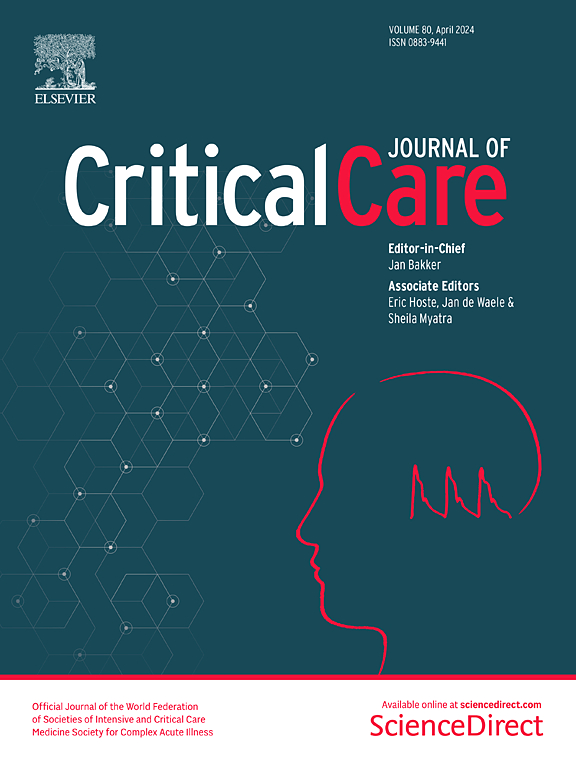The effects of vasopressor choice on renal outcomes in septic shock: a systematic review of randomised trials as a guide for future research
IF 9.3
1区 医学
Q1 CRITICAL CARE MEDICINE
引用次数: 0
Abstract
Patients with septic shock are high risk for developing acute kidney injury (AKI), with its associated morbidity. This systematic review assessed the evidence for an effect on renal outcomes from choice of vasopressor. Searches were conducted on Medline, Embase, Cochrane Central, congress abstracts and trial registries. The search strategy included septic shock, vasopressor agents and renal impairment. Inclusion criteria were non-crossover randomised controlled trials of adult septic shock comparing individual or combinations of vasopressors and placebo controlled trials. Primary outcome was the incidence of AKI in study participants. Secondary outcomes were AKI duration, renal replacement therapy (RRT) rate, RRT duration, renal failure free days, requirement for long term RRT and Major Adverse Kidney Events (MAKE) at 30 and 90 days. A total of 4259 patients, from 17 studies, were included. Vasopressin and terlipressin studies predominated. In 8 studies reporting AKI rate, no effect was seen relating to vasopressor choice. RRT rate was the most reported secondary outcome. Of five studies that investigated the role of vasopressin, only one showed significant benefit. Alongside limited reporting, no conclusive benefit was demonstrated in other secondary outcomes. No studies reported requirement for long term RRT, MAKE 30 or 90. This is the first systematic review focussed on renal outcomes with differential vasopressor therapy in septic shock. It illustrates the paucity of evidence supporting a particular vasopressor. Also highlighted are problems of population and study heterogeneity, as well as the focus on RRT as a proxy for renal outcomes. Standardised renal outcome reporting, large and appropriately powered trials and focussed sub-population studies are required to further inform renal focussed vasopressor research and practice. This systematic review was prospectively registered on PROSPERO (CRD42023481778).血管加压药物选择对脓毒性休克患者肾脏预后的影响:一项随机试验的系统综述,可为今后的研究提供指导
脓毒性休克患者发生急性肾损伤(AKI)及其相关发病率的风险很高。本系统综述评估了血管加压药选择对肾脏预后影响的证据。检索是在Medline, Embase, Cochrane Central,国会摘要和试验登记处进行的。搜索策略包括感染性休克、血管加压药物和肾功能损害。纳入标准是成人感染性休克的非交叉随机对照试验,比较单独或联合使用血管加压剂和安慰剂对照试验。主要结局是研究参与者AKI的发生率。次要结局是AKI持续时间、肾脏替代治疗(RRT)率、RRT持续时间、无肾功能衰竭天数、长期RRT所需时间和30天和90天的主要肾脏不良事件(MAKE)。共纳入了来自17项研究的4259名患者。抗利尿激素和特利加压素的研究占主导地位。在8项报告AKI发生率的研究中,没有发现与血管加压药物选择有关的影响。RRT率是报道最多的次要结局。在调查抗利尿激素作用的五项研究中,只有一项显示出显著的益处。除了有限的报道外,在其他次要结局中没有确凿的益处。没有研究报告要求长期RRT, MAKE 30或90。这是第一个系统回顾集中在肾脏结果与不同的血管加压治疗脓毒性休克。它说明了支持一种特定血管加压药的证据的缺乏。还强调了人口和研究异质性的问题,以及关注RRT作为肾脏结局的代理。标准化的肾脏结果报告、大型和适当的试验和集中的亚人群研究需要进一步为肾脏集中的血管加压药物研究和实践提供信息。本系统评价在PROSPERO (CRD42023481778)前瞻性注册。
本文章由计算机程序翻译,如有差异,请以英文原文为准。
求助全文
约1分钟内获得全文
求助全文
来源期刊

Critical Care
医学-危重病医学
CiteScore
20.60
自引率
3.30%
发文量
348
审稿时长
1.5 months
期刊介绍:
Critical Care is an esteemed international medical journal that undergoes a rigorous peer-review process to maintain its high quality standards. Its primary objective is to enhance the healthcare services offered to critically ill patients. To achieve this, the journal focuses on gathering, exchanging, disseminating, and endorsing evidence-based information that is highly relevant to intensivists. By doing so, Critical Care seeks to provide a thorough and inclusive examination of the intensive care field.
 求助内容:
求助内容: 应助结果提醒方式:
应助结果提醒方式:


